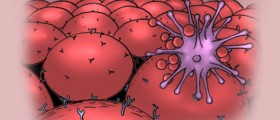
Cushing’s syndrome or Cushing’s disease is a hormonal disorder associated with prolonged high levels of hormone cortisol, which is why it is sometimes called hypercortisolism. Cortisol performs several important functions in the body- it regulates blood pressure, reduces inflammation, regulates the metabolism of protein, fats and carbohydrates, but it also regulates the way in which the body responds to stress.
This disease is relatively rare and it affects 15 to 20 out of every million people each year. The common age of patients with Cushing’s syndrome is between 20 and 50.
Symptoms of Cushing’s syndrome
The symptoms of this disorder vary from person to person, but some of them are typical for almost all patients, such as rounded face and upper body obesity, fat around the neck and thin arms and legs. In children, Cushing’s syndrome causes obesity along with slow growth.
This disorder may also affect the skin, making it fragile and thin, easily bruised, with slow healing. Stretch marks, usually pink, appear on parts of the body such as the belly, the buttocks, thighs, breasts and upper arms.
Since Cushing’s also affects the bones, making them brittle, even the simplest tasks may lead to aches and even fractures.
Fatigue, hypertension, high blood sugar, depression, anxiety and irritability are commonly seen in patients with Cushing’s.
Women with Cushing’s tend to have excess facial hair and problems with menstrual cycles, while men may become less fertile and with lower libido.
Treatment for Cushing’s syndrome
The treatment for Cushing’s syndrome varies from patient to patient, depending on the underlying cause of excess cortisol. Treatment options for those disease may involve surgery, chemotherapy, radiation or drugs that inhibit cortisol.
Cushing’s may be caused by long-term use of glucocorticoid drugs prescribed for another condition, such as rheumatoid arthritis, lupus, asthma and similar. In such cases the usage of those drugs should be ceased or reduced to the lowest effective dosage.
Pituitary adenomas are common causes of Cushing’s syndrome and the treatment usually applied for this problem is surgery to remove the tumors.
Another possible cause of Cushing’s syndrome is ectopic ACTH syndrome. This syndrome involves benign or malignant tumors secreting ACTH outside the pituitary gland, in other parts of the body, such as lungs. ACTH or adrenocorticotropin is a hormone that stimulates the adrenal glands, so they produce more cortisol.
These tumors must be removed, if possible. If they are malignant, the patient will also receive chemotherapy or radiation therapy.
The same goes for adrenal tumors, which are a possible cause of Cushing’s syndrome.

















Your thoughts on this
Loading...